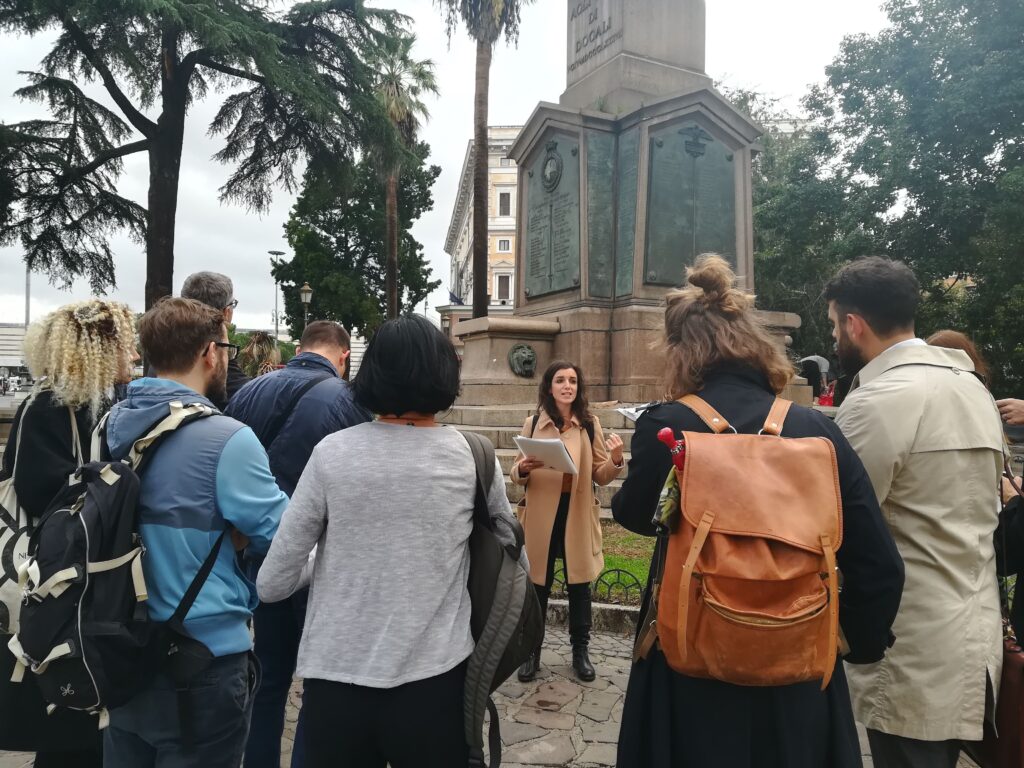On the 4 and 5 November 2019, the Istituto Storico Austriaco in Rome hosted an international and interdisciplinary workshop entitled “Built to last? Material Legacies of Italian Colonialism”. Organised by Markus Wurzer (University of Graz) and Sebastian De Pretto (University of Lucerne), this event was the occasion to present for the first time the map project “Postcolonial Italy” to specialists of the topic. These two days of thrilling debate on Italian colonial heritage allow us to meet new contributors to help us developing this collaborative map.

“The question how European societies are dealing with the legacies of their colonial pasts are currently increasingly attracting both public and scientific attention. For some reason, Italy’s public is hardly concerned by this international discussion. Scholars, however, have begun to address the heritage of Italian colonialism almost 20 years ago. Even though this research covered colonial heritage in a very broad context, it failed to address a key dimension: the material traces, such as architecture, arts, objects in museums, monuments, street names etc. In the context of Italy’s past such artefacts became objects of scientific research only recently and only in the context of the fascist regime’s legacy in Italy. However, the colonial material traces of both the fascist and the liberal era have not been addressed yet. Italy’s colonial memory is still dominated by silence, denial, suppression, and various myths. While the Italian empire has almost been forgotten by most people today, it left – even though it was relatively small and short-lived compared to other European colonial empires – a lot of material and cultural traces throughout Italy as well as its former colonies.”
Report
The international and interdisciplinary workshop “Built to Last? Material Legacies of Italian Colonialism” took place from November 4-5 at the Istituto Storico Austriaco in Rome. The conference aimed at investigating the material worlds of fascist imperial expansionism and the materiality of its memory in Italy as well as in its former colonies. Thus, the workshop contributions examined various material forms such as architecture, arts, museums, monuments or toponymy which were left behind by Italy’s colonial epoch. Thereby, a new understanding of colonialism and its memory in public space was gained.
The conference enjoyed considerable resonance, which was underlined by the high number of participants. This success was largely owed to the international speakers, who contributed to the conference from various scientific disciplines: The opening speech of the institute’s director Prof. Andreas Gottsmann was followed by nine insightful papers. Scholars from the UK, Italy, Austria and Switzerland presented case studies from the fields of architecture, art history, public history and memory studies. For example, there were contributions on the history of architecture in Greece and Sicily, on art historical transfer processes between Rome and East Africa or the Adriatic region, as well as on monuments and street names in South Tyrol. Besides the keynote speech on material legacies in Sardinia by Valeria Delano and Alessandro Pes, the postcolonial memory walk through the city centre of Rome, guided by Serena Alessi, marked a particular highlight of the conference. The tour led to a number of locations in the capital city that are crucial for Italy’s colonial memory. Based on another presentation of an online project by Daphné Budasz and Markus Wurzer, which maps the material traces of colonialism in Italian cities, the conference theme’s relevance for current debates about such disputable legacies became once more apparent. Hence, the conference participants expressed their wish that the discussion should be continued with further international conferences and the establishment of a permanent expert network. In this regard, a joint publication was also considered.
Finally, the organizers would like to thank the three sponsors, the Association for the Study of Modern Italy, the Society for Italian Studies and the Istituto Storico Austriaco for their generous support. Without their cooperation the workshop would not have been possible.
Report written by Sebastian De Pretto

